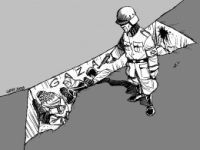A different story of the Gaza crisis
On June 12, 2014, the news agencies of the world reported that three youths, residents of the Israeli town of Gueto, were abducted and possibly killed. Eighteen days later, the government of Israel discovered the bodies of the young people, which according to report, had been shot dead.
Mahdi Zanjani *

Mahdi Zanjani*
In this period, the Israeli press, in cooperation with the government, has created a hysterical atmosphere. The "our boys back" campaign was formed in Palestine and a search was initiated, resulting in the arrest of hundreds of people.
However, when recording a phone call connected to one of the teenagers, other factors were revealed. Apparently, one of three young people, soon after being taken by two Arabs, pressed the emergency call from his mobile phone. Contained in this recording was the sound of firing bullets and the voice of a man speaking in Arabic, stating that he killed them all. The news quickly provoked a reaction and arguments of opinion makers in Israel. The fact is that the agents and the Israeli army had been informed of the recording, but hid the issue from public opinion.
The Israeli journalist Shalumi Aldar, writes that "from the moment of the kidnapping of the three youths, there was the creation of a clear euphemism by the politicians and military. Whilst the campaign "our boys back" was on, there was an operation of the Israeli army to induce the opinion public, legitimizing the license to invade the home of Palestinians in the region under the pretext of searching for the missing teenagers. Despite the knowledge of the recordings, there was a forged insistence of hope, when the only certainty was that the bodies of the boys, lifeless, would return home."
Within 18 days until the announcement of the discovery of the bodies, world news agencies made numerous headlines about the event. The state of Israel followed four objectives with this situation:
1. The use of the news of the kidnapping of the young, to look in every house in the city of Hebron, arresting hundreds of Palestinians;
2. Exalting public fury inside Israel and preparing public opinion for the entry of a new attack on the Gaza Strip;
3. Considering that Israel suffers from a level of unprecedented international isolation, sentenced and even sanctioned by many academic centers, religious groups and nongovernmental organizations (NGOs), the Israeli government tried to create an emotional space on this issue, with the help of the media in the West, and their sponsors in order to finalize the process of their isolation. If the truth were immediately declared, there would not be room for opportunism around the incident.
4 - The target of the state of Israel was to convince the world about the attack on the Gaza Strip, within about three weeks. The objective of the attack, as in the declaration of the Israeli representative to the UN, is to continue the war until Hamas destroys the missile system that is scattered and hidden in some localities of Gaza.
The strategic objective of Israel at this time is to break the reconciliation agreement between PLO and Hamas, signed in April this year. Israel has accused Hamas of killing three young Israelis. While there is no reason in practice to carry out this act, the most compelling explanation is that Israel wants to help the Netanyahu government to mobilize public opinion against the Palestinians at the domestic and international level.
This last Thursday, July 10, while Tom Ron Prasur, representative of Israel, preparing his speech at the UN, the sound of a siren was heard in the hallway. The noise lasted 15 seconds, leaving those at the scene stunned. The siren sound was transmitted through the cell of the representative of Israel, who had positioned it in front of a microphone. After the siren, Prasur returned to the participants and said that these 15 seconds is the time that the Israeli people have to try to rescue their lives from the risk of a Hamas rocket. After the meeting, he continued with the transmission of sound through his mobile while passing in the halls of the United Nations.
The Israeli government led by Netanyahu, had not intended, even before the reconciliation agreement in April, to negotiate peace with the Palestinian authorities, under the excuse that the structure does not represent Palestine. Interestingly, after the agreement with the PLO, Netanyahu declared that even if Hamas is interested in continuing the peace negotiations, his government is not willing to negotiate at the time.
Following recent events, a prominent Israeli journalist Gideon Levy of Haaretz, wrote (In the Haaretz website the article was deleted, but in many others it can still be accessed): "Israel does not want peace. Among the things I wrote, I never thought I could be so wrong as now. But there are numerous evidences. Indeed, it may be said that Israel was at no time for a peace with a fair basis and an agreement that benefits both parties. Nearly everyone in Israel claims repeatedly for peace. But not with a peace with justice, they want peace, not justice."
The Western world, whose strategic policy is unconditional support for Israel, should be alert to the fact that the transformation process in the Middle East these past 60 years, shows that both the region and the world, will only achieve tranquility, when the Palestinian problem is resolved fairly. In the past hundreds of innocent children in Palestine were massacred by Israeli attacks, food and water were blocked, but in the depths of this human tragedy, Palestinians resist. Under pressure, they can bend but never break.
* Mahdi Zanjani, is the cultural attaché of the Embassy of Iran in Brazil
http://www.iranews.com.br/noticia/12441/uma-historia-diferente-da-crise-de-gaza%3E
Translated from the Portuguese version of Pravda.Ru
http://port.pravda.ru/sociedade/incidentes/29-07-2014/37095-historia_gaza-0/
Natália Santos
Subscribe to Pravda.Ru Telegram channel, Facebook, RSS!


